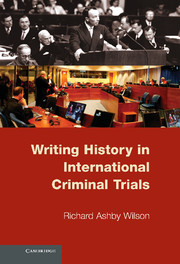Book contents
- Frontmatter
- Contents
- Epigraph
- Preface and Acknowledgments
- Figures and Tables
- Glossary
- 1 Assessing Court Histories of Mass Crimes
- 2 What Does International Actually Mean for International Criminal Trials?
- 3 Contrasting Evidence: International and Common Law Approaches to Expert Testimony
- 4 Does History Have Any Legal Relevance in International Criminal Trials?
- 5 From Monumental History to Microhistories
- 6 Exoneration and Mitigation in Defense Histories
- 7 Misjudging Rwandan Society and History at the International Criminal Tribunal for Rwanda
- 8 Permanent Justice: The International Criminal Court
- 9 Conclusion: New Directions in International Criminal Trials
- Appendix: Methodology and the Survey Instrument
- Bibliography
- Index
1 - Assessing Court Histories of Mass Crimes
Published online by Cambridge University Press: 05 June 2012
- Frontmatter
- Contents
- Epigraph
- Preface and Acknowledgments
- Figures and Tables
- Glossary
- 1 Assessing Court Histories of Mass Crimes
- 2 What Does International Actually Mean for International Criminal Trials?
- 3 Contrasting Evidence: International and Common Law Approaches to Expert Testimony
- 4 Does History Have Any Legal Relevance in International Criminal Trials?
- 5 From Monumental History to Microhistories
- 6 Exoneration and Mitigation in Defense Histories
- 7 Misjudging Rwandan Society and History at the International Criminal Tribunal for Rwanda
- 8 Permanent Justice: The International Criminal Court
- 9 Conclusion: New Directions in International Criminal Trials
- Appendix: Methodology and the Survey Instrument
- Bibliography
- Index
Summary
NOTHING BUT THE LAW?
Now, in a country of laws, the whole law and nothing but the law must prevail.
– Tzvetan Todorov (1996:114–5)In the literature on legal responses to crimes against humanity, a consensus has emerged that courts of law produce mediocre historical accounts of the origins and causes of mass crimes. This book reviews recent international criminal trials, and it finds much evidence to support a critical view of law's ability to write history. At the same time, historical debates in international trials have provided important insights into the underlying factors of an armed conflict. By examining closely the concrete strategies pursued by prosecutors and defense lawyers, this study seeks to understand their motivations for venturing into the past in the first place and to discern the legal relevance of historical evidence.
A cursory review of recent international criminal trials would lend support to a skeptical stance toward the place of history in the courtroom, and at no point has the incompatibility of these two activities been more evident than during the four-and-a-half-year trial of Slobodan Milošević at the International Criminal Tribunal for the Former Yugoslavia (ICTY). With the death of Milošević in March 2006, only months before the court could pass judgment, a British Financial Times article diagnosed the Tribunal's central mistake: “the court confused the need to bring one man to account with the need to produce a clear narrative of war crimes and atrocities for the history books.”
- Type
- Chapter
- Information
- Writing History in International Criminal Trials , pp. 1 - 23Publisher: Cambridge University PressPrint publication year: 2011



